A thoughtfully asked question from an Economics 101student, – “How can we fix global poverty” – set Niroj Bhattarai on a serendipitous journey that would be surprising and illuminating while serving as the dissertation research for his Ph.D.
Niroj Bhattarai said he was lucky. Lucky to have good parents when growing up in Nepal who were steadfast in their support of a good education; lucky to have chosen to go to undergraduate school in Ohio and connect with a soon to be life-long mentor and father figure who helped sponsor his U. S. education; lucky to have decided on the liberal arts and economics instead of aeronautical engineering as his field of study; lucky to have chosen Fort Collins and CSU for his doctoral degree and to have obtained an economics faculty position at Front Range Community College (FRCC) while completing his Ph.D. While he was deliberating on his dissertation topic and also teaching economics at Front Range, Bhattarai received a seemingly simple question from one of his students: “How can we fix global poverty?”
The question seemed singularly momentous and inspired a frontline service project for the Front Range students that would help them understand some of the dynamics of development and gender economics. Why not have the students help some rural schools in his native Nepal with needed materials, thereby actually having a direct positive impact on the students’ quality of life. And for the Nepalese students, it would be an affirmation of the importance of maintaining their education. Two honor students in Bhattarai’s Principles of Microeconomics class (Harmony Fox and Emily Thomas) offered to raise funds for school supplies for the Sri Kausika Primary School in the village of Mulghat, District of Dhankuta in the southeast part of Nepal.
With the students’ work and research on the project, local fundraising began - one with the FRCC Honor Society Phi Theta Kappa, and two more with the Ft. Collins Rotary and Rotary District 5440. Together, these grassroots collaborations raised $3,399.
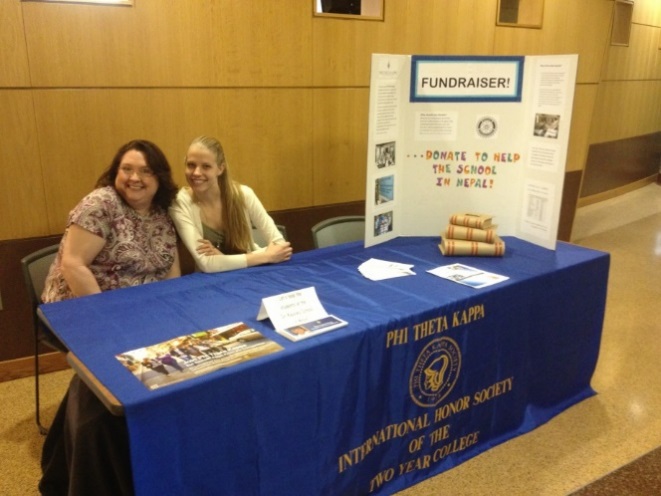
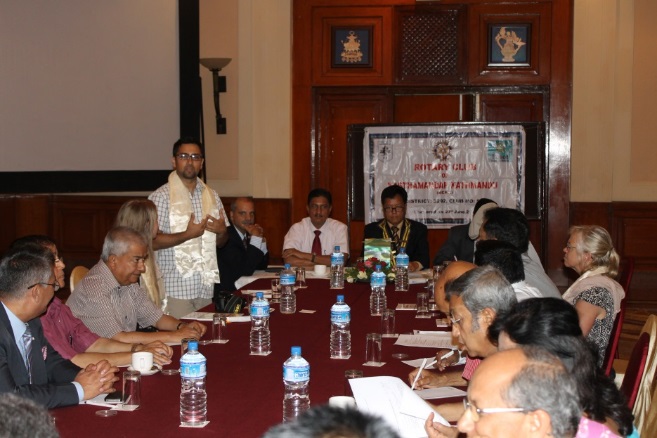
But when planning to offer books, pens, and other school supplies to the headmaster in Mulghat, Bhattarai was surprised when the headmaster indicated what they really needed was running water and gender-specific restrooms. Upon reaching adolescence, girls in the school did not feel comfortable using the only bathroom facility – a common outhouse with no privacy to speak of, no washing stations, or ways to deal with feminine hygiene products – and they were simply dropping out of school.
The idea that adolescent girls were dropping out of school because they felt embarrassed or underserved as to matters of privacy and hygiene was astounding to Bhattarai. It was indicative that there were cultural factors at work with regard to education in Nepal worth exploring, particularly across gender. Because education is key to better success in life for Bhattarai, and is important for developing human capital, this new awareness became the inspiration for his dissertation topic and research, “What factors affect school attendance? Quantitative and qualitative study of evidence from Nepal.”
That defining moment not only determined Bhattarai’s dissertation, it also changed the trajectory of the fundraising project. Instead of supplying pens and pencils, he and his students were going to build gender-specific bathrooms.
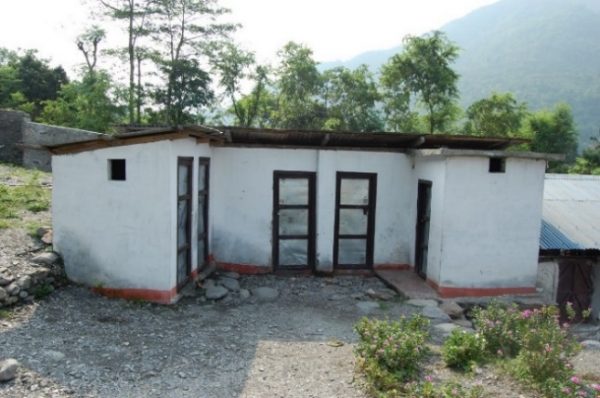
The funds completed the needed bathroom project and brought running water from a nearby aquifer. No longer did the students have to spend time and effort hauling water for daily needs, and the girls had facilities that afforded them privacy, hygiene, and dignity. Enrollment at the school increased from 122 to 166, with 30 of the additional 44 students being girls. The water pipeline also supplied extra water that could be sold to locals, providing a long-term solution to maintenance of the system. An extraordinary accomplishment from grassroots collaborative efforts across continents.
Engaged Scholarship: Teaching, Service and Research
What began as a service project and sparked Bhattarai’s specific research focus, lead to illuminating data relevant to present and future educational opportunities of Nepalese children.
Bhattarai’s dissertation research involved gathering information through a 51-question survey of 365 participants from grades 8- 10 in seven schools in and around the Kathmandu Valley to identify economic and social factors that influence student enrollment and attendance patterns. After gathering important data as to whether the schools were in urban or rural areas, student and family information such as family status, household characteristics, wealth, health of family members, and student information such as gender, age, and ethnicity, Bhattarai was able to shed light on what factors influence student educational participation. It is one thing to enroll in school; it is another to attend school on a regular basis.
Results of the research showed student attendance affected by such factors as whether a school has computers for students, sufficient play areas, running water and gender-specific bathrooms, as well as other factors including educational levels of parents, and number of children in the family. Also noted were cultural factors that are difficult to address such as localized traditional attitudes about gender that could discourage females from attending school. Factors that influence attendance provide critical information that can serve current and future policy makers in their decisions on practices and allocation of resources for education.
The unfolding of this project and the subsequent academic inquiry exemplifies the the 21st-century land-grant mission, where teaching, research and service combine to assess needs for and provide positive change to communities near and far.
Emily Thomas, Front Range student, described her involvement with this service and research endeavor as a life-changing experience. “Working on this project with the Sri Kausika Primary School in Nepal opened my eyes to issues of gender and educational equity, development economics, and barriers that exist on an international and local level. The experience was an integral part of my academic and professional journey that has enriched my life as well as that of others.”
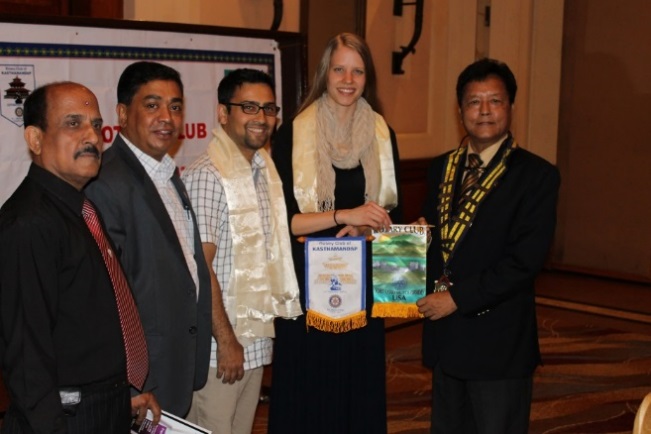
Interdisciplinary Work
If Bhattarai has been lucky, he has never taken it for granted. He has capitalized on it with focus, purpose, dedication, inspiration, kindness, trustworthiness, optimism and generosity. He pays it forward through exemplary teaching skills combined with compassion and the understanding of the human condition that comes from studying economics through the lens of the liberal arts.
Bhattarai loves the idea of interdisciplinary work within the liberal arts environment. He would like to see more collaboration among people in the liberal arts disciplines to help address issues of global poverty and development economics in the future through an interdisciplinary, international action “Poverty Lab.” “The Poverty Lab would bring together experts from different disciplines, and using mixed-methods research approaches, address issues of poverty, locally and globally. It would also engage our undergraduate students, expose them to the world of social research, and inspire them to use their liberal arts education to look for solutions to pressing issues through engaged scholarship,” he says.
His collaborators at CSU agree. “A research-to-action initiative could be an exciting new investment for CSU and prospective donors. Housed in the College of Liberal Arts, it would provide a place for empirically-minded researchers to design and initiate experimental interventions with goals of decreasing poverty and inequality of opportunity,” says Dr. Anita Alves Pena, interim chair of the economics department. “Niroj’s work demonstrated how faculty and student researchers in Colorado can make a difference for individuals across the world while at the same time having a scholarly impact here. We would love to continue this type of effort with the right partners.”
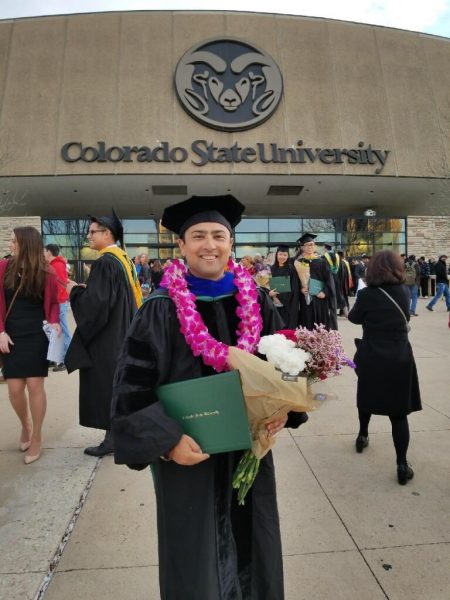 Niroj Bhattarai received his Ph.D. in December 2017. He is currently the chair of the Social and Behavioral Sciences Department at FRCC. In addition, he opened an international food market on the west side of Fort Collins, called Rams Bazaar, featuring ethnic foods made by local entrepreneurs as well as other international food items.
Niroj Bhattarai received his Ph.D. in December 2017. He is currently the chair of the Social and Behavioral Sciences Department at FRCC. In addition, he opened an international food market on the west side of Fort Collins, called Rams Bazaar, featuring ethnic foods made by local entrepreneurs as well as other international food items.
